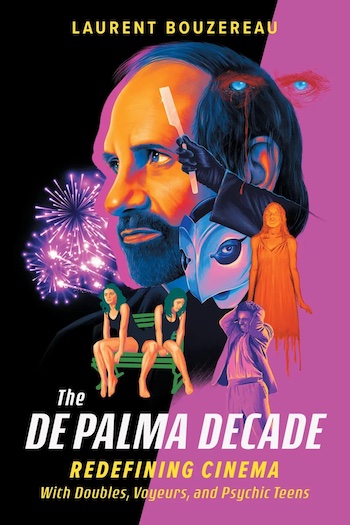Book Review: “The De Palma Decade” — The Making of a Cinematic Legend
By David Stewart
Despite excessive hero-worshiping, “The De Palma Decade” is a thoroughly enjoyable portrait of director Brian De Palma, the counterculture master of the scream scene.
The De Palma Decade: Redefining Cinema with Doubles, Voyeurs, and Psychic Teens by Laurent Bouzereau. Running Press, 320 pages, $30.
 In 2018, Variety critic Owen Gleiberman made his decades-long dismay with the career of filmmaker Brian De Palma crystal clear: “…when it came to the art heroes who let me down, no one threw me for a loop — and could keep throwing me — quite like Brian De Palma. I wrestled for years with the disappointment his movies provoked in me (though I do think a small handful of them, like Scarface and The Untouchables, are terrific). And that’s because in theory, they always sounded like so much fun! Elaborately clever meta-Hitchcock jungle gyms of pure escapism.”
In 2018, Variety critic Owen Gleiberman made his decades-long dismay with the career of filmmaker Brian De Palma crystal clear: “…when it came to the art heroes who let me down, no one threw me for a loop — and could keep throwing me — quite like Brian De Palma. I wrestled for years with the disappointment his movies provoked in me (though I do think a small handful of them, like Scarface and The Untouchables, are terrific). And that’s because in theory, they always sounded like so much fun! Elaborately clever meta-Hitchcock jungle gyms of pure escapism.”
Well, six years later it looks as if Brian De Palma is back on top of the jungle gym, at least when it comes to critical appreciation. Recently, three books have come out honoring the 83 year-old director’s life and work; Glenn Kenny’s entertaining The World is Yours: The Story of Scarface; De Palma on De Palma: Conversations with Samuel Blumenfeld and Laurent Vachaud; and The De Palma Decade by award-winning filmmaker/producer Laurent Bouzereau. Like the volumes from Kenny, Blumenfeld, and Vachaud, Bouzereau’s study focuses on De Palma’s films (he sticks to the director’s high period, from 1973’s Sisters to 1981’s Blow Out). But this cinematic love letter contains more than in-depth commentary: there’s biography, oral history, and personal reflection. The result is a playful, even whimsical, contribution to the effort to consolidate De Palma’s auteur status, to evaluate De Palma’s reputation as one of America’s most important, though divisive, filmmakers.
Bouzereau wrote a previous book on the filmmaker, so he knew he had to bring something fresh to the table. There are new interviews with the director and his collaborators, including actors Nancy Allen, Sissy Spacek, and John Lithgow, production designer Jack Fisk, composer Paul Williams, and editor Paul Hirsch. The interviewees offer considerable insight into De Palma’s execution of action, from the prom scene in Carrie to the use of split screen in Sisters and the climatic Steadicam chase in 1993’s Carlito’s Way. This said, the book offers, at times, a retread of the information in Noah Baumbach and Jake Paltrow’s addictive 2016 documentary, De Palma, released by A24, the home of De Palma disciples Ari Aster (Hereditary, Beau is Afraid) and Ti West (The MaXXXine trilogy). Still, Bouzereau ventures into uncharted territory that should please die-hard cineastes, posing the question of why Hi Mom! and Get to Know Your Rabbit haven’t received the same scalpel-sharp analysis given to the director’s other early films. And the chapter on Phantom of the Paradise, particularly Williams’ recollection of writing his song “Old Souls” is moving. (Note: there’s a delightful story in the book about Orson Welles trying to get his film The Other Side of the Wind up and running.)
Keep in mind that Bouzereau is a fanboy. This is a deeply personal reflection on the films of a director he places in a higher slot in the pantheon than Alfred Hitchcock. Unlike the probing Hitchcock/Truffaut, the oral history and analysis here tends to excessively soft on De Palma’s failures. The interviews are a mixed bag. Cliff Robertson’s “aw shucks” take on shooting Obsession contentedly stays at the level of the actor’s tan and ego while Spacek and Fisk are tender (and perceptive) about their working and personal relationship on Carrie. As for De Palma’s ultimate standing among the gods of cinema, put me down as a skeptic regarding some of his films. 1984’s Body Double wasn’t so much a thriller as a comedic pastiche on porn chic Los Angeles while 2006’s The Black Dahlia was a very frustrating product — it is a muddled adaptation of James Ellroy’s novel, its narrative undercut by flaccid dramatic tension. Still, if you approach the book’s hyperbole with caution, The De Palma Decade has the merits of Bouzereau’s documentaries Five Came Back and Faye: it is a thoroughly enjoyable portrait of a counterculture master of the scream scene. At its finish, I couldn’t help but utter one of De Palma’s customary exclamations, “Holy Mackerel!”
David Stewart currently teaches at Emerson College, Plymouth State University, and Southern New Hampshire University. His first book, There’s No Going Back: The Life and Work of Jonathan Demme, will be published by the University of Kentucky Press in 2025.

Looking forward to getting the De Palma book.